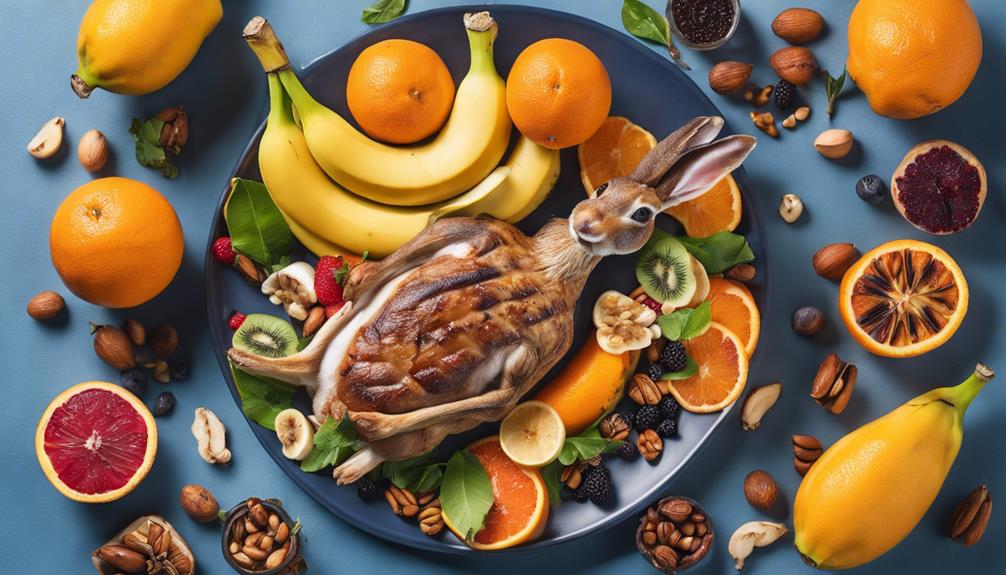10 Best Nutritional Benefits of Rabbit Meat
Rabbit meat provides valuable benefits for your health. It is rich in high-quality protein essential for muscle building and repair. With low fat content, it offers a lean protein source that supports overall health. Rabbit meat is a great source of essential vitamins like B12 and minerals such as iron, zinc, and magnesium, promoting bone health and energy production. It is heart-healthy, low in cholesterol and saturated fats, containing omega-3 fatty acids. With its digestibility and energy-boosting properties, rabbit meat makes a nutritious addition to your diet. Consider exploring rabbit meat for a range of health advantages.
High Protein Content
Rabbit meat boasts a remarkably high protein content, making it a valuable source of this essential nutrient for individuals seeking a lean and nutritious dietary option. Protein is crucial for muscle building and repair, making rabbit meat an excellent choice as a post-workout recovery food. With its lean protein content, rabbit meat provides the necessary amino acids needed to support muscle growth and recovery after physical activity.
In comparison to other meats, rabbit meat is particularly rich in protein while being low in fat. This composition makes it an ideal choice for individuals looking to increase their protein intake without consuming excessive amounts of saturated fats. The high-quality protein found in rabbit meat helps in repairing muscle tissue that may have been damaged during exercise, aiding in quicker recovery times.
When consumed as part of a balanced diet, rabbit meat can play a significant role in supporting an active lifestyle. Its protein content not only assists in post-workout recovery but also helps in maintaining muscle mass and overall body function. Including rabbit meat in your diet can be a smart choice for meeting your protein needs while keeping fat intake in check, promoting muscle health and aiding in physical recovery.
Low in Fat
With its minimal fat content, rabbit meat stands out as a lean and nutritious protein source for individuals conscious of their dietary fat intake. Rabbit meat is exceptionally low in fat compared to other meats, making it a healthy choice for those looking to reduce their fat consumption. The low-fat content of rabbit meat makes it a preferred option for individuals aiming to maintain a balanced diet without compromising on taste or nutritional value.
When cooking rabbit meat, it's crucial to consider its low-fat content to prevent the meat from drying out. Using cooking techniques such as braising, stewing, or roasting with added moisture can help retain the meat's tenderness and juiciness. These methods allow the meat to cook slowly, resulting in a flavorful and succulent dish.
Despite being low in fat, rabbit meat offers a delicate and slightly sweet flavor profile that pairs well with a variety of herbs, spices, and marinades. Its subtle taste makes it a versatile protein that can be incorporated into various dishes, from stews and curries to grills and salads. Experimenting with different flavor profiles can enhance the natural taste of rabbit meat, providing a wholesome and satisfying dining experience.
Rich in Vitamins
An essential aspect of rabbit meat is its richness in vitamins, providing valuable nutrients essential for overall health and well-being. Rabbit meat is a powerhouse of vitamin packed goodness, offering a range of essential vitamins that play crucial roles in various bodily functions.
One of the key vitamins found in rabbit meat is vitamin B12, vital for nerve function and the production of DNA and red blood cells. This nutrient is crucial for maintaining healthy nerve cells and preventing a type of anemia called megaloblastic anemia. Additionally, rabbit meat is a great source of niacin (vitamin B3), which is essential for converting food into energy, maintaining healthy skin, and supporting the nervous system.
Moreover, rabbit meat contains high levels of riboflavin (vitamin B2), which is necessary for energy production and the metabolism of fats, drugs, and steroids in the body. Riboflavin also acts as an antioxidant, helping to fight free radicals and protect cells from damage. Furthermore, rabbit meat provides significant amounts of vitamin B6, which is important for brain development and function, as well as for the formation of hemoglobin, the protein in red blood cells that carries oxygen throughout the body.
Source of Minerals
Rich in essential minerals crucial for maintaining optimal bodily functions, rabbit meat serves as a valuable source of important nutrients for overall health and well-being. When consumed, rabbit meat can significantly contribute to fulfilling your mineral requirements, aiding in various bodily functions.
Some key minerals found in rabbit meat include:
- Iron Absorption: Rabbit meat is a rich source of heme iron, the form of iron that's most easily absorbed by the human body. Iron is essential for the formation of hemoglobin in red blood cells, which carries oxygen from the lungs to the rest of the body. Adequate iron intake is crucial to prevent anemia and maintain energy levels.
- Bone Health: Rabbit meat contains essential minerals like phosphorus, magnesium, and zinc, which are vital for maintaining strong and healthy bones. Phosphorus is a key component of bone mineralization, while magnesium is necessary for bone structure and zinc plays a role in bone formation and mineralization. Including rabbit meat in your diet can help support bone health and reduce the risk of conditions like osteoporosis.
Incorporating rabbit meat into your meals can be a delicious way to boost your mineral intake and support your overall health.
Low Cholesterol
A diet including rabbit meat can be beneficial for individuals aiming to maintain low cholesterol levels due to its naturally lean composition and favorable fatty acid profile. Rabbit meat is known for being low in cholesterol and saturated fats, making it a heart-healthy protein option for those with specific dietary restrictions.
Maintaining low cholesterol levels is crucial for heart health, as high cholesterol can increase the risk of heart disease and other cardiovascular conditions. By incorporating rabbit meat into your diet, you can help lower your cholesterol intake while still meeting your protein requirements.
Rabbit meat isn't only low in cholesterol but also rich in unsaturated fats, particularly omega-3 and omega-6 fatty acids. These essential fatty acids play a vital role in reducing inflammation, improving blood vessel function, and supporting overall heart health.
For individuals with dietary restrictions related to cholesterol or saturated fat intake, rabbit meat can be a valuable addition to their meal plans. Its nutrient-dense composition provides an excellent source of protein without the excess cholesterol found in other meats. By choosing rabbit meat as part of a balanced diet, you can support your heart health and meet your nutritional needs effectively.
Balanced Amino Acids
Rabbit meat provides a balanced array of essential amino acids necessary for maintaining optimal health and supporting various bodily functions. Amino acids are the building blocks of proteins, essential for a myriad of physiological processes within the body.
Here's how rabbit meat's balanced amino acid profile benefits you:
- Amino Acid Synthesis: Rabbit meat contains amino acids that play a crucial role in the synthesis of new proteins. These amino acids are essential for repairing and rebuilding muscle tissue after exercise or injury. Consuming rabbit meat can aid in muscle repair and recovery due to its rich amino acid content.
- Muscle Repair: The amino acids present in rabbit meat contribute to muscle repair by providing the necessary components for rebuilding damaged muscle fibers. This is especially beneficial for individuals engaged in physical activities or sports that require muscle strength and endurance.
- Protein Synthesis and Growth Hormones: Amino acids found in rabbit meat are vital for protein synthesis, a process crucial for the growth and maintenance of tissues in the body. Additionally, certain amino acids act as precursors for growth hormones, aiding in growth, development, and overall health.
Including rabbit meat in your diet can help ensure you receive a well-rounded supply of essential amino acids necessary for optimal bodily functions, muscle repair, and growth hormone regulation.
High Iron Levels

With high levels of iron, rabbit meat serves as an exceptional source of this essential mineral crucial for various physiological functions in the human body. Iron plays a vital role in the body by aiding in the production of red blood cells, which are responsible for carrying oxygen to all parts of the body. One of the key benefits of consuming rabbit meat, rich in iron, is its ability to support optimal iron absorption in the body. Iron absorption is a complex process that can be influenced by various factors, and the heme iron found in rabbit meat is readily absorbed compared to non-heme iron found in plant-based sources.
Anemia prevention is another significant advantage of including rabbit meat in your diet due to its high iron content. Anemia is a condition characterized by a lack of healthy red blood cells, leading to symptoms such as fatigue, weakness, and pale skin. By consuming rabbit meat, you can help prevent the development of iron-deficiency anemia and maintain healthy blood levels. The iron present in rabbit meat not only supports the prevention of anemia but also contributes to overall energy levels and cognitive function by ensuring adequate oxygen transport throughout the body.
Incorporating rabbit meat into your diet can be a delicious and nutritious way to boost your iron intake and promote optimal health.
Omega-3 Fatty Acids
Omega-3 fatty acids play a crucial role in various physiological functions in the human body, contributing to overall health and well-being. Rabbit meat is a rich source of these essential fatty acids, offering numerous benefits for your health.
- Brain Health: Omega-3 fatty acids are known for their positive impact on brain health. Docosahexaenoic acid (DHA), a type of omega-3 found in rabbit meat, is a major structural component of the brain and is vital for cognitive function. Including rabbit meat in your diet can support brain development and help maintain optimal brain health throughout life.
- Inflammation: Omega-3 fatty acids possess anti-inflammatory properties that can help reduce inflammation in the body. Chronic inflammation is linked to various diseases, including heart disease. By consuming rabbit meat, which is a good source of omega-3s, you can potentially lower inflammation levels and reduce the risk of inflammatory conditions.
- Heart Disease: Omega-3 fatty acids have been extensively studied for their role in reducing the risk of heart disease. These fatty acids can help lower blood pressure, reduce triglyceride levels, and decrease the risk of abnormal heart rhythms. By incorporating rabbit meat into your diet, you can promote heart health and support overall cardiovascular well-being.
Including rabbit meat in your meals can be a delicious way to boost your omega-3 intake and reap the associated health benefits.
Energy Boosting

Enhancing your body's energy levels can be achieved through incorporating nutrient-rich foods that provide sustained vitality and stamina throughout the day. Rabbit meat is a fantastic choice for boosting your energy levels due to its high protein content, essential vitamins, and minerals that support muscle recovery and enhance overall performance.
Protein is crucial for muscle recovery and growth, making rabbit meat an excellent option for individuals looking to boost their energy levels. The amino acids in rabbit meat help repair and rebuild muscle tissue, supporting your body after physical exertion and enhancing your performance in various activities.
Moreover, rabbit meat contains B vitamins such as B3 (niacin) and B12, which play a vital role in metabolism support and energy production. These vitamins help convert food into energy and facilitate nutrient absorption, ensuring that your body efficiently utilizes the energy obtained from the food you consume. By including rabbit meat in your diet, you can optimize your metabolic processes and enhance your overall energy levels.
Easily Digestible
Rabbit meat stands out as a highly digestible protein source, making it a favorable option for those seeking easily digestible food choices. When it comes to digestion efficiency, rabbit meat excels due to its low fat content and high protein quality. The tender texture of rabbit meat also contributes to its digestibility, allowing your digestive system to break it down more easily compared to other meats.
In addition to being easily digestible, rabbit meat enhances nutrient absorption, providing your body with essential vitamins and minerals efficiently. Here's how rabbit meat supports your digestive system:
- Lean Protein: Rabbit meat is a lean protein source, which means it contains high-quality protein with minimal fat content. This lean protein is easier for your body to digest, ensuring you get the most out of every bite.
- Vitamins and Minerals: Rabbit meat is rich in essential nutrients like iron, zinc, and B vitamins, which are crucial for various bodily functions. The high bioavailability of these nutrients in rabbit meat promotes efficient absorption in your digestive tract.
- Balanced Nutrition: Consuming rabbit meat as part of a balanced diet can aid in overall digestion and nutrient absorption, supporting your health and well-being in the long run.
Incorporating easily digestible rabbit meat into your diet can optimize your digestion efficiency and enhance nutrient absorption, making it a smart choice for those looking to improve their overall health.
Frequently Asked Questions
Can Rabbit Meat Be Safely Consumed by Individuals With Food Allergies?
If you have food allergies, it's crucial to take precautions before consuming rabbit meat. Always consult with a healthcare provider to ensure it's safe for you.
Look for allergy-friendly recipes that cater to your specific needs. Be aware of potential cross-contamination risks in handling and cooking rabbit meat.
How Does Rabbit Meat Compare in Taste to Other Commonly Consumed Meats?
When comparing the taste of rabbit meat to other commonly consumed meats, the flavor profile of rabbit is often described as mild and slightly sweet. It has a delicate texture and is leaner than many other meats, which can affect its taste.
Rabbit meat is versatile and can take on the flavors of various seasonings and cooking methods. Overall, it offers a unique and enjoyable culinary experience for those looking to explore different protein options.
Are There Any Specific Cooking Methods That Enhance the Nutritional Benefits of Rabbit Meat?
When cooking rabbit meat, consider various roasting techniques to enhance its flavor profiles. Experiment with seasoning options like herbs, garlic, and citrus to elevate the taste.
Stay updated on culinary trends to try out new methods of cooking that can bring out the best in rabbit meat. By exploring different cooking styles and flavors, you can create delicious and nutritious meals that showcase the unique qualities of rabbit meat.
What Is the Environmental Impact of Rabbit Meat Production Compared to Other Meats?
When comparing rabbit meat production to other meats, you'll find that it has a lower carbon footprint due to rabbits' efficient feed conversion rates and relatively low methane emissions. This makes rabbit meat a more sustainable choice.
Additionally, rabbit farming generally requires less land and water compared to larger livestock, contributing positively to environmental sustainability.
In terms of animal welfare and ethics, rabbits are typically raised in more humane conditions, which is an important consideration for conscious consumers.
Is Rabbit Meat Suitable for Individuals Following Specific Dietary Restrictions, Such as Keto or Paleo Diets?
If you're following keto or paleo diets, rabbit meat can be a great addition. It's low in fat and high in protein, making it a suitable choice for these dietary restrictions.
While it may not fit into vegetarian diets, rabbit meat is commonly used in Mediterranean cuisines, providing a lean and flavorful option.
Incorporating rabbit meat into your meals can offer unique nutritional benefits that align well with keto and paleo dietary guidelines.
Conclusion
In conclusion, rabbit meat offers a plethora of nutritional benefits that make it a valuable addition to any diet. With high protein content, low fat, and rich in vitamins and minerals, rabbit meat provides essential nutrients for overall health and well-being.
Its low cholesterol and high iron levels, combined with omega-3 fatty acids, offer a heart-healthy option. Additionally, its easily digestible nature and energy-boosting properties make rabbit meat a smart choice for those looking to optimize their nutrition.
